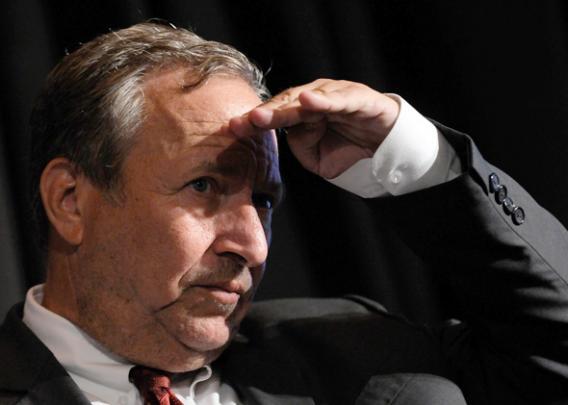Lawrence Summers’ friends have a bad habit of vouching for him when they shouldn’t. At the same time, his detractors have a bad habit of launching kitchen-sink arguments that vastly overstate the case against his appointment as the next Federal Reserve chair. Last week Reuters financial blogger Felix Salmon fired the latest anti-Summers salvo in this spirit, arguing that installing him would deliver “a central bank which had, to a first approximation, zero independence from the government” and set “a horrible precedent” of politicizing the office. CNBC’s John Carney piled on and proclaimed the situation “actually worse than Felix thinks.”
This is total nonsense. For starters, Summers would do far less to diminish the Fed’s independence than these lurid theories suggest. But more to the point, the hope that Summers would diminish the Fed’s independence is, on the merits, far and away the best reason to be optimistic about him getting a job. Absolutely zero Summers confidants inside or outside the administration are willing to even remotely make this case, but there’s a strong argument that an Obama crony and Democratic Party hack is exactly what the country needs in a central bank chief.
To see why, it’s useful to return to one of the saddest documents of the Obama era. I have in mind an Aug. 26, 2009, Neil Irwin article detailing the president’s decision to nominate Ben Bernanke for a second term as Fed chair. It was, at the time, a somewhat surprising move as Obama had been thought likely to replace the George W. Bush appointee with someone who shared more of his values and priorities. But according to Irwin, “the fact that Bernanke was a Bush appointee and a bit distant from the Obama White House may have worked in his favor” because it “helped assuage fears in financial markets that a chairman closer to Obama might boost the economy in the short-run at the expense of high inflation.”
In retrospect, this was entirely backward. A chairman who financial markets feared would try to juice the economy in the short run at the expense of higher medium-term inflation is exactly what the economy needed.
The reason is that low inflation, though normally a prized commodity of central bankers, is counterproductive during severe recessions. A central bank normally tries to boost the economy by lowering interest rates. That encourages families to invest in durable goods (cars, boats, furniture) and home renovations while encouraging businesses to invest in capital equipment and the construction of new houses. That investment leads to hiring and reduces the unemployment rate, so you want to keep lowering interest rates until you can get back to full employment. The problem is that interest rates can’t go below zero, because if they did, households and businesses could store cash in vaults rather than in sub-zero bank accounts.
For years now, rates have been at zero. That’s where fiscal policy is supposed to step in. The government can borrow money to increase demand, while the Fed holds interest rates at zero to prevent that borrowing from “crowding out” private activity. But ever since 2010, Congress has been reducing government borrowing rather than increasing it. That’s left us to rely on untested and controversial quantitative easing measures to try to bolster a still-weak economy.
But there is another way: inflation.
In normal times, a central bank that does too much to goose the economy will get inflation as a consequence. Demand for goods and services rises faster than the economy’s actual ability to produce them, so prices rise rather than real output going up. But with interest rates at zero, the effect goes in the opposite direction. An increase in the expected rate of future inflation works, in effect, as a reduction in the inflation-adjusted interest rate. That, in turn, should spur investments and purchases of durable goods, leading to more hiring and less unemployment.
Under Bernanke, the Fed hasn’t attempted to make this work. Central bankers cherish—overcherish, in my opinion—their victory in the war on inflation in the early 1980s, and are generally happier to see millions of people have their lives permanently ruined by long-term unemployment than take the slightest risk of sparking a new round of inflation. What’s more, there are some doubts as to whether a central bank could even credibly promise to deliver future inflation if it wanted to.
These are, however, both dysfunctions induced by the cult of central bank independence. A central bank chief who saw himself as a close political ally of the president, and recognized that poor macroeconomic performance would reflect poorly on the skills of his friends, colleagues, and protégés on the economic team, might be willing to put inflation paranoia aside. Even better, precisely as the Obama team apparently “worried” back in 2009, financial markets might believe he’d be willing to tolerate more inflation. That would be a de facto rate cut, and would boost the economy.
Of course, in the longer term, this strategy only works if the central bank chief really is willing to overlook a bit of inflation in order to boost the economy. The belief that he’ll do it starts the cycle, but doesn’t end it. So the mere fact that people worry Larry Summers won’t be independent enough counts as a consideration in his favor. But to really seal the deal, he has to follow through and actually compromise the Fed’s inflation-fighting mission in order to help his friends in the White House.
I’m still not sold on the idea that he’s the best person for the job. But at the end of the day, Summers’ ties to the White House are a feature, not a bug. If Obama goes with him, as it looks like he will, let’s hope Summers doesn’t forget that he owes his position to a relatively narrow circle of friends that just so happens to include all the key economic decision-makers in the administration, and he owes them some favors.
